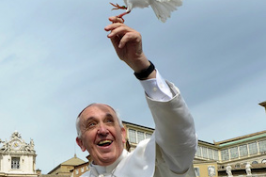ICN Media Course 5 - Using Social Media

Photo by Sara Kurfeß on Unsplash
(This guidance is intended for people who are fairy new to social media and perhaps setting up accounts for the first time.)
Social media can be a very useful way to reach wider audiences - including people that may not go to church or follow church news. According to Statista.com as of January this year there were 53 million active social media users in the UK - that's 77.9% of the UK population. 98% of UK users use social media on their mobile devices. The average UK user spends 110 minutes on social media per day. Most Catholic organisations and leaders have social media accounts. As of last month, Pope Francis had 18.9 million followers on his English language Twitter page. @Pontifex - with many millions more on his accounts in eight other languages.
There are many different, free, social media platforms and trends are changing rapidly - but here are some of the most popular that are well worth joining if you want to report on something or spread the news about an upcoming event.
Facebook offers pages where you can post text, photos and videos to a particular audience. You can have a page for you personally (for putting up those pictures of family events, pets etc) and you can also set up separate pages for organisations and groups etc - like your parish or church group.
Facebook also has the 'Facebook Live' facility which enables you to stream live events. During the lockdown, many parishes that weren't online were able to film Masses each week - with no more equipment than a mobile phone or a tablet. Advice: If you are setting up a new Facebook page do check all the security guidelines - make sure you know who has access to edit the page.
X (previously Twitter)
This service allows users to post short (280 character) message 'tweets' to followers - with the facility for followers to 'retweet' to their followers, 'Like' , and 'Reply. You can also tweet pictures and links.
Choose your profile name carefully. Keep it short and memorable. When you set up - maybe follow some other relevant organisations on X. A useful tool to increase your readership is adding hashtags # on key words in your text. There is a Search facility which puts Tweets together under topics. For example: Bono is coming to your school. Make sure you give him a hashtag #Bono - so anyone searching for news about him will find your page.
UPDATE on X:
Many thousands of people and several large media outlets have stopped using X for since November 2024. Reasons cited include 'toxic rhetoric' and the new terms of service introduced by the owner Elon Musk. People seem to be migrating to other sites such as THREADS and BLUESKY that offer a similar facility the X without the AI involvement. It will be interesting to see how this trend develops.
Instead of words - Instagram is a social media network built entirely around sharing pictures and short videos. A giant online photo album. Make sure you have permission to publish people's pictures.
NEXT DOOR
Not one of the main social media sites but a useful very local app providing news and information for individual neighbourhoods. If your parish or school is having a concert, show or jumble sale - don't forget to advertise it here.
General advice
With all of the above sites - When you set up - follow the security guidelines to ensure that no one else can write on your pages. Keep each one up to date. There's no point in having a Facebook page if your top story is still promoting a Christmas event in April. Build up a following - by following other relevant sites who may follow you back.
And finally - ration your screentime. Social media can be very addictive - but its not the be all and end all of media!


















